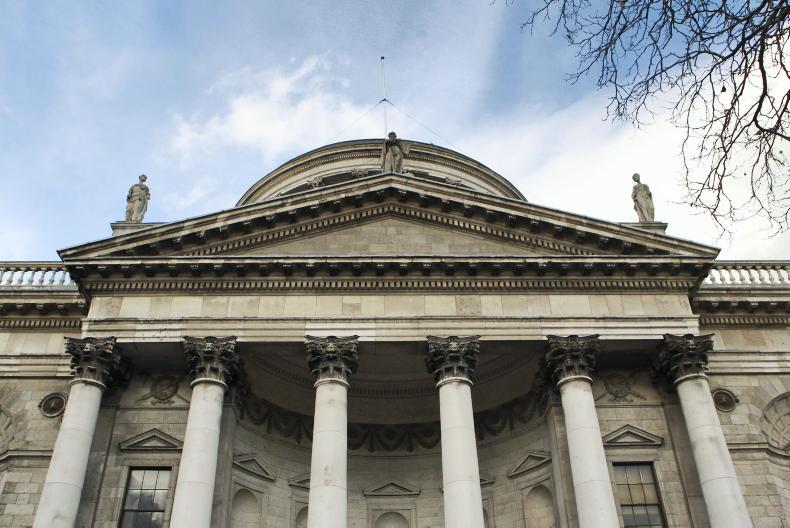A man who was granted a Tipperary farm in a 2012 court case has now been ordered by a High Court judge to pay €350,000 in legal fees.
After over 12 years of court cases in which he was awarded a 122ac farm and 75% of his court fees to be covered as “costs in the administration of the estate”, William Naylor has been ordered to pay up to €350,000 to a firm of solicitors.
In the main court proceedings, which was initially between Mr Naylor and his biological sister Jean Maher over the ownership of the farm, legal costs have been awarded as “costs in the administration of the estate” that total over €1.5m.
However, evidence given in 2011 for the initial case estimate that the estate is only worth €525,000.
Background
The longstanding case revolves around the plaintiff, Mr Naylor, challenging the last will of his late father Michael Hoare, who died in 2007. The defendant in the case - his sister Jean Maher - was originally the executor of Mr Hoare’s estate.
Mr Naylor only learned after the death of what he thought was his stepfather that Mr Hoare, on whose farm in Co Tipperary he lived and worked for more than 30 years, was his biological father.
The last will of the Mr Hoare - also Ms Maher’s biological father - made on 9 November 2006 left the farm to the defendant, while a previous will made on 30 September 2005 had left the farm to the plaintiff.
In the 2006 will, Mr Naylor was to receive €150,000, but not the farm that he claimed Mr Hoare had promised to him.
After a 21-day High Court case, Mr Justice O’Keefe awarded the farm to Mr Naylor, as well as 100% of his fees from the courts.
This was on the grounds that Mr Naylor had been promised the farm for many years and had worked on the farm for decades for minimal pay. However, a second motion - that the last will was extracted by duress and undue influence by the defendant - was dismissed.
On appeal to the Court of Appeal in 2018, Justice Micheal Peart found that Mr Naylor should only get 75% of his court fees paid for and that he must disclaim the bequest of the €150,000 he was to receive in the 2006 will.
Both sets of costs - the plaintiff’s and defendant’s - in the Court of Appeal were made “costs in the administration of the Estate”.
Then, in 2018, the defendant's solicitor Mr Gilvarry was successful in proceedings to have Ms Maher removed as executor. Mr Gilvarry was the appointed as administrator in her place.
Subsequently, circuit court proceedings commenced between Gilvarry and Maher concerning another property in the estate. This led to further costs being incurred in the administration of the estate.
As a result of all of these cases, the position now is that the estate has become insolvent and cannot discharge all of the costs that have been incurred.
The fees
During the proceedings, between 2011 and 2018, Mr Naylor was represented by a firm of solicitors which was different to those that represented him afterwards.
The second firm has since ceased practice and the file of legal costs was passed to the current firm making this application.
The court ruling states that Mr Naylor had paid an initial sum of €30,000 to his senior counsel in advance of the High Court hearing in 2012. According to the firm, a further total sum of €351,853.50 is due for the balance of the fees for the High Court and Court of Appeal hearings, to James Lucey and Company.
However, as discussed in the 2012 and 2024 cases, Mr Naylor left school early in his life so he could work on the farm and has limited education and literacy so “any lack of precision or documentation in relation to his claimed understanding of the fee arrangements made in 2011 has to be assessed” by the judge.
At the end of this case, Justice Oisín Quinn said that the firm - James Lucey and Company - could not seek relief by claiming against the farm.
Instead, the firm is entitled to charge up to €351,000, which would be paid to Mr Naylor by the administrator of the estate, Mr Gilvarry.
Priority
Justice Oisín Quinn made a second judgement in court last week, concerning who would receive priority for getting their legal costs paid, the executor/administrator of an estate (Mr Gilvarry) or the beneficiary Mr Naylor.
Justice Quinn acknowledged during the case that the “estate does not have enough money to pay both and it appears barely has enough assets to pay all of the costs of the executor/administrator”.
Mr Gilvarry estimated that legal costs incurred on behalf of the executor/administrator come to approximately €967,000 and the costs paid already by Mr Naylor amount to €193,000, with a further €350,000 claimed to be due to counsel for the main proceedings.
“In other words, the claimed legal costs incurred by the estate and ordered as 'costs in the administration of the estate' exceed €1.5m, in respect of an estate, estimated to have assets just below €0.5m,” the judge said.
Therefore, if Mr Gilvarry was to be given priority in this case, then there will be no funds available to make any contribution to Mr Naylor’s legal costs.
With the estate considered insolvent, the Succession Act provides that the assets are to be administered by order of “[t]he funeral, testamentary and administration expenses have priority”.
Both Mr Naylor’s costs and Mr Gilvarry’s costs fall under the term ‘administration expenses’ and Justice Quinn was to decide how to interpret this ambiguity, in which he sided that the administrator, Mr Gilvarry, would have priority.






 This is a subscriber-only article
This is a subscriber-only article










SHARING OPTIONS: